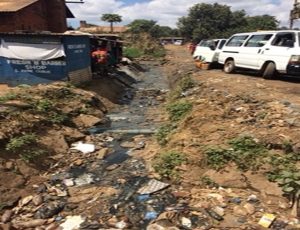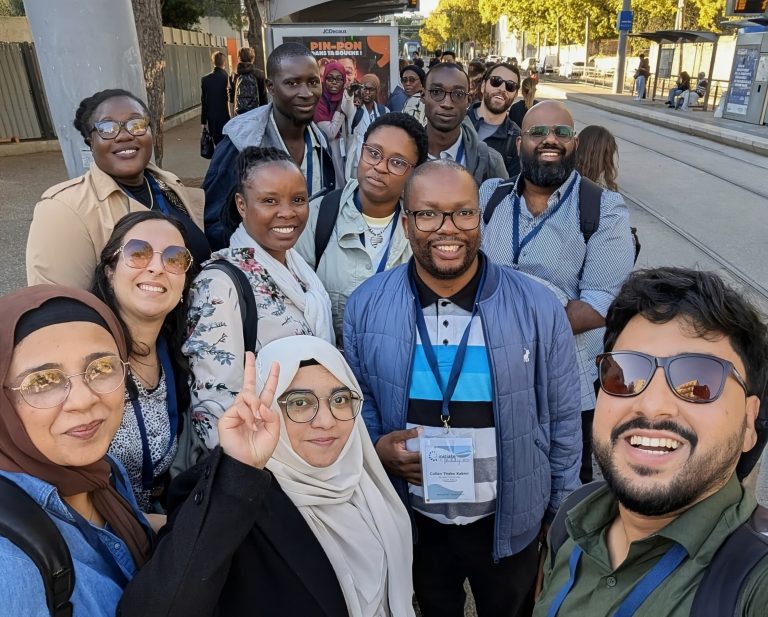World Water Day Series – Dr Emmanuel Akpabio
The 2023 World Water Day comes with the theme ‘accelerating change’. Accelerating progress towards universal access to water has never become more urgent considering the COVID-19 pandemic and the possibility of future outbreaks. Adequate supply of suitable water is vital to improving sanitation and quality hygiene and is central to public health management. Global estimates indicate over a billion people lack access to improved drinking water supplies, and 2.6 billion people do not have adequate sanitation. WHO and UNICEF estimate the greatest numbers (c. 80%) of those without access to these services are in Eastern and Southern Asia and sub-Saharan Africa (SSA). These represent serious global health burdens in terms of the consequences associated with a lack of access to drinking water, inadequate sanitation and poor hygiene (WaSH). Movement towards the UN’s 2030 targets are very mixed, with some evidencing great progress and others less impressive.
In regions like Latin America and the Caribbean, northern Africa and much of Asia, 90% or more of their populations have access to clean drinking water. This compares to c. 60% of people in SSA overall, but which also has strong regional and socio-economic differentiation. In 35 countries over 90% of the richest quintile in urban areas have improved water sources and over 60% have piped water on their premises (Salaam-Blyther, 2012). The corollary is that in rural areas such services are often non-existent. South Asia (led by India) recorded substantial progress, having halved the proportion of its population using unsafe sanitary systems. In 2010, 69% of people had access to improved sanitation services up from 46% in 1990, with the result that only c. 4% still practiced open defecation as opposed to 67% in the previous two decades. The equivalent data in SSA points to more modest gains and unsanitary practices fell only by 15% overall.
Climate change is expected to harm the quantity and quality of available drinking water and negatively impact sanitation and hygiene provision. Increased flooding (magnitudes and frequency) will damage critical WaSH infrastructures and may contaminate much relied upon sources such as open wells or surface waters, especially as most settlements (rural and urban) in SSA depend on pit latrines for excreta disposal. Eradicating open defecation in such contexts therefore becomes more pressing. However, the reality of having to negotiate between basic needs for existence and the financial and time commitments to build and maintain an effective pit latrine hampers progress. This has been the practical dilemma of rural Malawi especially the vulnerable communities, such as Chikwawa, Chilwa, Chikale, and several others. On the other hand, prolonged seasonal drought in Malawi and northern Nigeria are already severely limiting citizens’ access to drinking water supplies and further raising the risk of infectious diseases outbreak including cholera, diarrhoea, dysentery, etc.
The WaSH sector in SSA is performing less well than in other regions of the world. Visible progress may be recorded in isolated and organised settlements with networked facilities vis a vis urban outskirt, emergency settlements (independent persons displaced camps-IDPs), open markets, rural, riverine and other settlements in difficult locations. Beyond geography, access inequality across gender, age, disability, sexuality and economic circumstances is still a major issue. With these statistics, progress toward achieving the goal and targets set out by the SDGs by 2030 is less guaranteed. Generally, the common factors leading to underperformance are poor institutional capacity and weak governance; excessive influence from external actors; socio-economic challenges and the impact of cultural and religious values and practices.
While the WaSH sector elements include drinking water, sanitation and hygiene, policies and programmes excessively focus on drinking water supplies and the productive uses of water. Sanitation and hygiene are rarely integrated in policy priority. For instance, over 90% of Nigeria’s and Malawi’s WaSH sector spending is consumed by the water component (for drinking and irrigation). For instance, national WaSH sector budget for Malawi is typically < 1% and mainly focusing on drinking water services. Specific budgetary commitment to sanitation and hygiene is rare except dedicated funds from donor support. Newspapers in Nigeria report spending on the WaSH sector fallen to 0.27% of GDP as compared to 0.7% in 1990. Where sub-units exist for sanitation, interest centres on human excreta disposal, whereas hygiene issues rarely have policy visibility. Across SSA there is evidence of what is possible, with Malawi often singled out for attention because of good progress being made as a result of relative political stability and less ethnocentric and religious interests in public governance.

Limited political attention on the links between WaSH activities and public health is widely blamed for a lack of holistic, effective and pro-poor improvement policies and a lack of agency amongst civil society, especially the most vulnerable, to assert their needs. International agencies will invariably approach the issues through the lens of the UN SDG (especially SDG 6.1 water and sanitation for all) or through the public health emergency arising from the global COVID-19 pandemic or regional transmissible disease crises such as the Ebola outbreak in West African which captured the public imagination and catalysed some behavioural changes including hand washing before and after toilet use.
The biggest challenge to WaSH sector performance is the influence of cultural beliefs and religious values that tend to work against behavioural changes and innovative practices. Socio-cultural practices and beliefs in water deities and sanitary taboos are widely recognised and can often present a barrier to the adoption of engineering-based approaches to traditional practices (Akpabio, 2012; Akpabio & Rowan, 2021). Similarly, straightforward scientific logic regarding risk of disease transmission is often subordinated to deep-rooted cultural beliefs hindering progress in improving public awareness and behavioural change. An anonymized interview quote is offered by way of illustration:
“… in the Nsanje district… females during menstruation (M’bvade, meaning unclean woman)… are prohibited from using communal latrines, stemming from the belief that males may develop a fat leg (elephantiasis of lymphocele) if they inadvertently tread or cross where an M’bvade has defecated or urinated…; in areas where custom frowns upon the use of the same latrine by daughters-in-law and fathers-in-law or some sons-in-law and mothers-in-law, the provision of separate latrines is favoured rather than attempting to change people’s attitudes…”.
In some cases, the fear of sorcerers and black magicians gaining access to human excreta (faeces) was the primary reason why people in the rural areas refuse to own latrines, preferring open defecation in the bush (Akpabio 2012, Akpabio and Takara 2014).
Accelerating change and improvement calls for better and holistic understanding of WaSH in relation to local socio-environmental, economic, geographical and cultural circumstances as a guide to evolving flexible engagements with local actors and communities for the purpose of evolving solutions that work. Unfortunately, the WaSH sector is poorly governed across sub-Saharan Africa. Different organizations and governmental levels pursue diverse and sometimes overlapping management interest with minimal or no specific mechanism for coordinating activities. The WaSH sector has no clear governance platform and institutional domain. In many countries, a multitude of organizations and sub-units are involved, yet performance progress in the sector is less satisfactory. As most agencies are politically created, it has always been difficult to pursue a common agenda due to conflicts of interest:
“I think we have so many agencies associated with WaSH…and sad to say most of them are not necessary…the politicians just wake up and create agencies to provide jobs for their supporters and people…”, declared by a senior Nigerian public official.
Inter-agency conflict and competition complicate the governance challenge and generate opportunities for external actor involvement. Over the years, a greater proportion of WaSH sector funding, projects and policies are driven by donor agencies and multilateral/regional organizations including the WHO, UNICEF, AFDB, etc. Donor-driven WaSH projects have a strong presence in Malawi through several top funding agencies and organizations including the Scottish Government. Implementation of funding projects, though in most cases in collaboration with national governments, follow mostly specific funding agency’s visions and ideologies, which serve specific purposes at a specific time span. However, their long-term sustainability are hardly guaranteed as funding dries up. In another perspective, most policy reforms in the WaSH sector follow the IMF/World Bank neoliberal templates of individualization, privatization/commercialization, deregulation, internationalization, neo-commodification and liberalizations. Public WaSH services in SSA countries, for instance, are run on a commercial basis (and at most times subsidized by public funds), and the cost of specific services, in most cases are beyond the financial reach of the citizens. Under this circumstance, the rich are more likely to benefit, while the poor are left to work out daily means of gaining access to improved WaSH services. These visions hardly cohere with local socio-economic needs and cultural values and, in some cases, produce tension and increase the rate of inequality in access to simple drinking water.
Addressing the existing gaps needs close working relationships with local stakeholders to co-evolve cost-effective, sustainable and community-driven management solutions. There is need to improve the relationship between the formal and informal actors and institutions through continuous dialogue and public consultation to improve the effectiveness of WaSH related policies and project implementation. Managing WaSH services in catchment-based context holds the prospect of encouraging such collaboration and inclusive management. The national public policies of imposing single and uniform WaSH management plans based on technological and neoliberal options across ecological boundaries hardly recognize environmental, cultural and socio-economic differences that shape access to essential WaSH services. In the context of limited budgetary resources, different ecological regions need different options that reflect local ecological circumstances. A catchment-based WaSH management approach is more likely to account for ecological differences and focus on solutions that work within the limits of available resources.
Dr Emmanuel M. Akpabio (http://orcid.org/0000-0001-6105-1782) is the Ag Director of International Programmes, University of Uyo. He received a Marie Sklodowsca-Curie Action Fellowship from the EU, based in the University of Dundee, where he continues to engage an International Associate of the UNESCO Dundee Centre for Water Law, Policy and Science. He is also a Life Fellow (FIWRA) of the International Water Resources Association (IWRA).
References:
Akpabio, E. M. and John S. Rowan (2021). The political economy of coordinating water, sanitation and hygiene management policies and programmes for Nigeria. Water International. https://www.tandfonline.com/doi/full/10.1080/02508060.2020.1867454
Akpabio, E. M. and K. Takara (2014). Understanding and confronting cultural complexities characterizing water, sanitation and hygiene (WASH) in sub-Saharan Africa. Water International 39 (7): 921-932. http://dx.doi.org/10.1080/02508060.2015.981782.
Akpabio E. M. (2012). Water meanings, sanitation practices and hygiene behaviours in the cultural mirror: a perspective from Nigeria. Journal of Water, Sanitation and Hygiene for Development 02(3): 168-181.
Salaam-Blyther T. (2012). Global access to clean drinking water and sanitation: US and International programs. Congressional Research Service. Research Report for Congress. www.crs.gov

